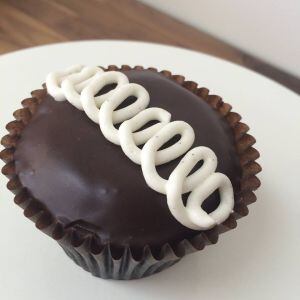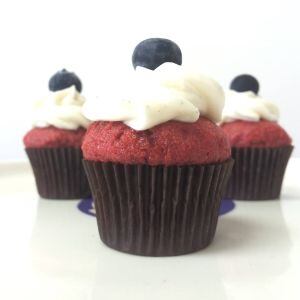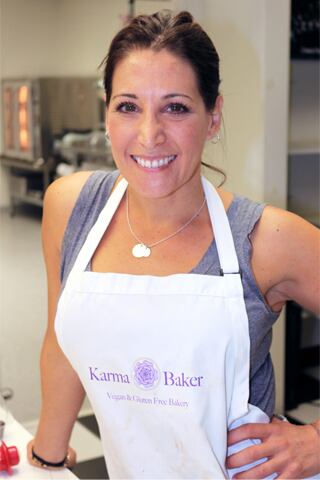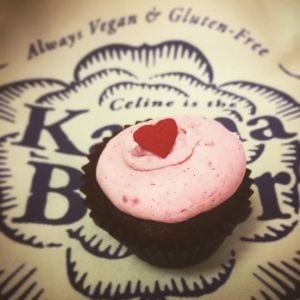“The products have got to deliver, and I set a really high bar, so people absolutely don’t have to compromise,” says Ikeler, who first started selling her creations to family, friends and local cafes; began renting space three-days-a-week in a small commercial kitchen shortly afterwards; and finally went on to open a retail and wholesale bakery in Westlake Village, west of Los Angeles.
Today, just over two years after she started experimenting in her kitchen, she supplies cafes, grocery stores and restaurants throughout the greater Los Angeles area, and is confident Karma Baker can make the progression from a local to a regional, and even a national brand.
The DIY option
As for the origins story, like a lot of smaller players in the gluten-free market – which has become more consolidated on the national stage, but is still highly fragmented on a regional basis – Karma Baker was born of frustration, says Ikeler, who wanted to give her neighbor’s daughter Sofia (who had allergies) top-notch cakes and brownies when she came to visit, but found the packaged wares on offer uninspiring.

A keen amateur baker, she resolved to bake her own, but was underwhelmed both by the technical and nutritional credentials of the off-the-peg gluten-free mixes available in stores, and opted instead to create her own flour, which has been critical to her success.
Indeed, Ikeler’s flour has been such a hit that not only does she use it across the Karma Baker range, but now sells it as a standalone product that home bakers can use to make their own gluten-free wares.
“I looked at flours and mixes from companies such as like Bob’s Red Mill, which are great," Ikeler told FoodNavigator-USA, "but I couldn’t find a flour I could use [she wanted to avoid beans, soy, and nuts], so I decided to create my own.”
Gluten-free trial and error
This was a lengthy and sometimes frustrating process of trial and error in which Ikeler – who doesn’t have a background in food R&D (she is an artist/animator by trade) – went back to basics, examined what function wheat flour (which contains gluten), dairy, eggs, cream and butter were serving in a range of baked goods, and sought out alternative ingredients that would perform a similar role.
To replace wheat flour, she came up with an all-purpose flour blend combining organic sorghum flour, tapioca, rice flour and potato starch that she uses in all of her recipes.
To replace eggs, she works on a case by case basis: “In some recipes where egg is mainly used as a binder, for example, I can replace it with apple sauce, in others I’ll use baking soda and vinegar, for example.”

Instead of butter, she typically uses coconut oil, which like butter, is high in saturated fats and starts to solidify once it gets below around 75 degrees.
Ancient grains
She has experimented with various ancient grains from teff to quinoa, but says many of them work better in snack bars, crackers and bread than cookies, cakes and muffins (Karma Baker’s signature item is a moist chocolate cupcake with cream frosting), as they can have a distinctive flavor and texture.
We have three kinds of customers
So does Ikeler worry about the faddish element to the gluten-free trend (the Gwyneth Paltrow effect), and the fact that some market researchers are convinced that this is a bubble that will ultimately burst, given that only a fraction of the population actually needs to avoid gluten for medical reasons?
Not really, says Ikeler, who says she knew from the outset that her products would have to be so delicious that the fact they are gluten-free would an incidental factor in the purchasing decision. In other words, if the cakes are awesome, and just happen to be gluten/dairy-free, the people will come, and come back again.

Besides, the number of people that are avoiding – or at least reducing - their dairy consumption, perhaps by switching to almond milk on their cereal, or choosing protein bars/powders with plant-based proteins instead of milk or whey protein, is growing steadily, she says.
“We have three kinds of customers: the celiac and allergy-type people, who can’t eat dairy or gluten; the vegans, and lifestyle vegans, which includes people that are vegan a few days a week – and they are really growing; and the people that follow every new health trend – I’m gluten-free this week, or paleo this week.
“But it doesn’t matter if they are committed [to a vegan or gluten-free lifestyle], because if they discover our products and love them, they will keep buying them.”

I want my products to be in Starbucks
As for her ambitions, Karma Baker could expand beyond the Los Angeles area, as its products are typically delivered frozen and retailers defrost them as needed and sell them in the chiller (at which point they have a 7-10-day shelf life, as she won’t use preservatives), she says.
“Right now we deliver directly, early mornings, in the Los Angeles area, and we’ve just started a mail order business, but longer term I want my products to be everywhere, to be in Starbucks.”

She is also considering opening up more small-scale plants with a store-front to supply local markets “kind of like La Brea Bakery when they started”. The alternative is operating from a much bigger manufacturing plant that everything is shipped from frozen.
They will tell you that you won’t make any money from doing business with us, but you’ll get great exposure …
However, as a small business, dealing with some high-profile grocery chains is not for the faint-hearted, she observes.
“I went to one meeting and came out of it wondering why would we ever want to sell here? The parameters to get into the stores are so demanding. They want all these certifications, and then they will actually tell you that you won’t make any money from doing business with us, but you’ll get great exposure. I can’t work like that.”
